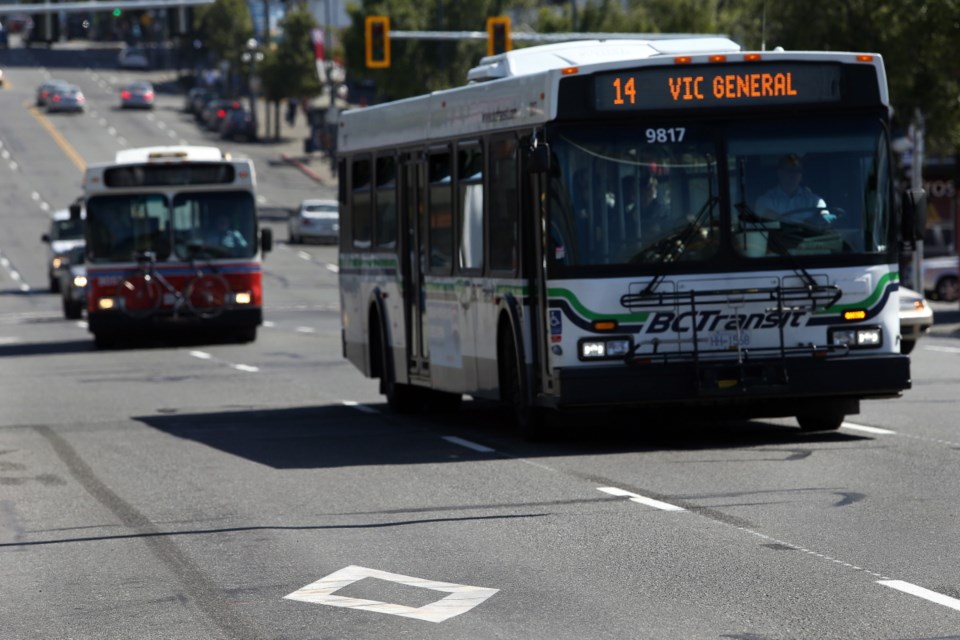B.C. Transit service expansion might come to a halt in Greater Victoria — and current bus routes curtailed — because the province passed on a two cent per litre boost in the gas tax in Tuesday’s provincial budget.
The Greater Victoria Transit Commission had “every reason” to believe an increase to 5.5 cents per litre would be approved, said chairwoman Susan Brice, based on conversations last fall with Transportation Minister Todd Stone and Finance Minister Mike de Jong.
The commission had been lobbying for the past three years to increase the transit portion of the gas tax in Greater Victoria, which has sat at 3.5 cents per litre since 2008 and raises $11.7 million a year.
Brice said additional money is needed to fund more bus service, including the 24,000 hours of operator time needed to run 10 new buses just purchased for $4.5 million.
The commission will discuss options at its Tuesday meeting, with potential reductions in service on the table in a bid to stay within budget. Its 2016-17 operating budget is $120.6 million.
“Without those funds … we at best might be able to hold status quo,” said Colwood Mayor Carol Hamilton, who sits on the commission.
If transit service doesn’t expand, single-occupant vehicles “will continue to dominate on our roads and traffic congestion will be the result — not just in the West Shore but throughout the region,” she said in an email to the Times Colonist.
“The busiest roads are the responsibility of the province — when will they take an interest in assisting the region in finding solutions?”
Greater Victoria is one of two regions in B.C. that has a gas tax to fund transit. A gas tax of 17 cents per litre helps to fund TransLink in the Lower Mainland.
Other transit systems, such as Nanaimo and Prince George, get about half of their budget directly from the province. Roughly one-third of the Greater Victoria system’s budget comes from the province.
If the province won’t approve a higher gas tax, then the commission should “seriously consider” seeking more of its budget directly from the province, Brice said.
“If we were funded at the same rate, it would add approximately $3 million to our coffers.”
Hamilton said there are only three ways to locally fund transit service: fares, property taxes and the gas tax.
“The commission has heard from users [that] buses are crowded and not frequent enough,” she said. “This requires more buses, more operators, which costs more money.”
The commission and riders have been doing their part to boost revenues, Brice said.
Fares were increased last April, bringing in an extra $2 million, and riders made more than 100,000 more trips in the same period. The property tax levy has more than doubled in the past decade to an average of $134.
She noted that 12 of 13 municipalities in the capital region and the Capital Regional District support a gas tax increase.
Ben Williams, president of Unifor Local 333, the union representing drivers, called the decision not to increase the tax extremely disappointing.
Buses sometimes have to bypass waiting passengers because they’re already full, especially on routes serving the University of Victoria and Camosun College, he said. The union has worked with B.C. Transit to maximize service by manipulating schedules, but there’s no wiggle room left, he said, with late-night service likely to be targeted for any reductions.
The Grumpy Taxpayer$ of Victoria applauded the decision to hold off on a pump tax increase, noting that a Ministry of Finance audit of B.C. Transit released last year stated that “there are opportunities for cost savings as well as improving effectiveness and efficiency across the business.”
The audit did not focus on Victoria, the largest of the regional transit systems, but noted staff here are paid Sunday premiums that cost $700,000 a year and that Unifor members averaged 15.4 sick days in 2014-15, up four days over 2010-11.
In June, Stone said there was a “tremendous need” to expand transit in Greater Victoria as it was at capacity and “just growing exponentially, so we’ve out-run our facilities.”
At that time, Stone announced $68 million in provincial funding for public transit, promising Greater Victoria a significant share. He wondered if the money, coupled with $90 million in grants from the federal government, might eliminate the need for a gas tax hike.
However, Brice said the commission made it clear to the province that expansion plans were “predicated on the expectation that we were going to get two cents a litre.”
Victoria Mayor Lisa Helps said more work is needed to get businesses on board for a gas tax increase.
“Transit is absolutely critical to the economic sense of the region,” she said, and the gas tax is needed to improve the system.
“We need to lobby hard that transit is good for the economy, whoever forms the government in May.”
— With a file from Amy Smart



